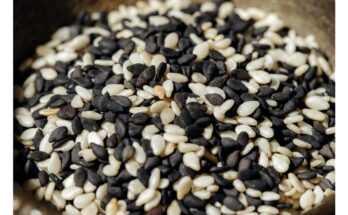Fennel (Foeniculum) is a yellow-green herb that grows as a biennial or perennial plant and is widely cultivated in India. It has been used as a flavoring agent for centuries, with all parts of the plant being aromatic. The seeds are especially fragrant, larger in size, and pale lime-green in color.
Nutritional Information
Fennel seeds contain:
Moisture: 6.3%
Protein: 9.5%
Fat: 10%
Fiber: 18.5%
Carbohydrates: 42.3%
Vitamins and Minerals (per 100 grams):
Calcium: 1.3 mg
Phosphorus: 0.48 mg
Iron: 0.01 mg
Sodium: 0.09 mg
Potassium: 1.7 mg
Thiamine: 9.41 mg
Riboflavin: 0.36 mg
Niacin: 600 mg
Vitamin C: 12 mg
Fennel seeds provide 370 calories per 100 grams.
Fennel Oil
The quality of fennel oil depends on the plant type and where it is grown. Indian fennel oil contains over 70% anethole and 6% fenchone, giving it a sweet flavor. High-quality fennel oil has 50-70% anethole. It also contains fatty acids like palmitic acid (4 mg) and petroselinic acid (60 mg).
Health Benefits and Uses
Leaves: Help with digestion, improve appetite, and act as a stimulant.
Seeds: Sweet in taste, help relieve constipation, and have aphrodisiac properties.
Oil: Used to ease digestive discomfort, reduce spasms, and in remedies for cough and stomach issues, especially for children.
A simple remedy for indigestion, bloating, and gas can be made by boiling one tablespoon of fennel seeds in 100 ml of water for 30 minutes. Chewing fennel seeds after meals can also prevent bad breath, indigestion, and constipation.
Culinary and Other Uses
Fennel seeds are commonly used to flavor soups, sauces, and meat dishes. Their oil is used in perfumes, medicines, and various food preparations. Due to its medicinal properties, fennel is included in the pharmacopoeias of many countries.




